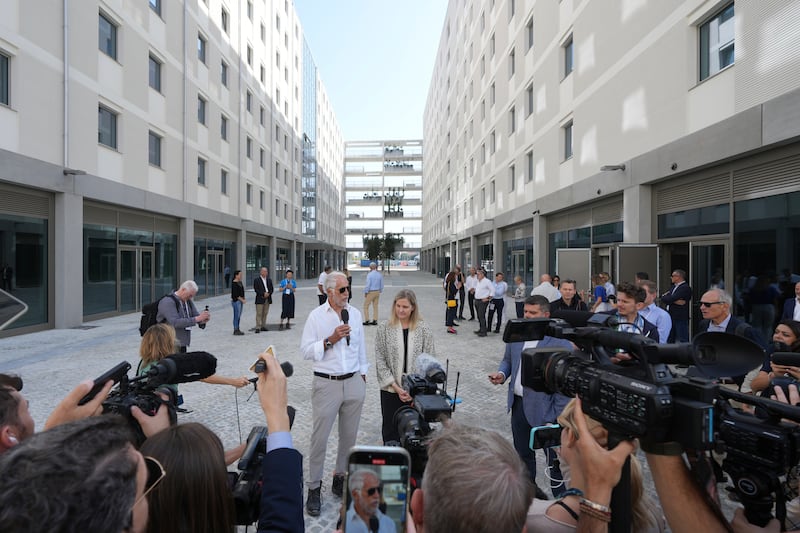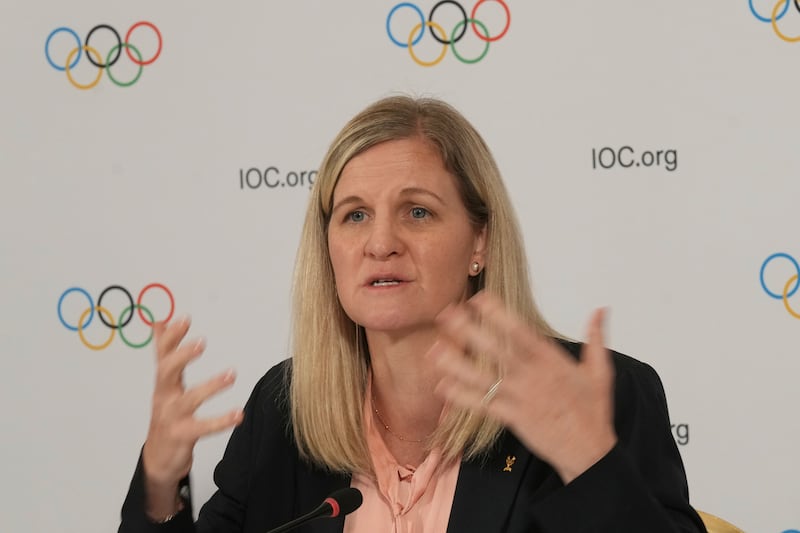With the world’s conflicts getting “worse and worse every day,” International Olympic Committee leaders reaffirmed their commitment to advancing peace through sport, the organization’s new president, Kirsty Coventry, told reporters Friday.
Pressed about the impact of last week’s fatal shooting of conservative activist Charlie Kirk at Utah Valley University in Orem, Coventry said the concerns raised earlier in the day during an IOC Executive Board meeting in Milan, Italy, weren’t focused on one specific event.
“I asked the Executive Board that we have a discussion looking at things in the global context, so looking at all the conflicts, all the controversial points that have happened, whether it be in the U.S. or anywhere else,” she said.
The 41-year-old from Zimbabwe, elected earlier this year as the first woman and first African to lead the Switzerland-based IOC, said that’s how she intends to deal with the world’s troubles going forward.
“I don’t think it’s just one event or we can take just one conflict over the other. There’s more and more things that are not our proudest moments as humanity, right, happening around the world,” Coventry said. “I think we have to acknowledge all of them.”
The focus during the closed-door discussion was on “where do we stand and what do we stand for” as the world’s top Olympic officials, she said, adding, “it was very clear from all of us that we stand for our values. In today’s world, we believe in those values.”
The IOC values are “important to be able to share with the world. They’re important to spread. They’re important to be able to educate. They’re important to, at the end of the day, build a better world through sport and to unify people, and to break down barriers,” Coventry said.
A statement issued later Friday, titled “IOC reaffirms: Sport must unite the world in peaceful competition,” says the Executive Board “stands firm in its belief that sport must remain a beacon of hope — a force that brings the whole world together in peaceful competition."
The world is described in the statement as “shaken by conflict and division.”

Concerns are raised about “the disruption of competitions across the world, the restriction of access to host countries for athletes, and the boycotting and cancellation of competitions due to political tensions,” actions that “deprive athletes of their right to compete peacefully.”
A new working group charged with protecting “the fundamental principles of Olympism” has been created with the aim of “ensuring that the IOC, the Olympic Games and sport remain politically neutral and can uphold their mission to unite the world in peaceful competition.”
Coventry said she will be in the United States next week for the United Nations General Assembly and to meet with heads of state there. She indicated the meetings are still being scheduled when asked if she planned to sit down with U.S. President Donald Trump.
Trump, who recently announced he’ll head up a White House task force on the 2028 Summer Games in Los Angeles, has called for the IOC to bar transgender athletes from the Olympics and issued travel bans,
After Coventry was elected IOC president in March, she told reporters asking about Trump that she’d “been dealing with, let’s say, difficult men in high positions since I was 20 years old,” learning “that communication will be key. That is something that will happen early on.”
She said then that she believed Trump “is a huge lover of sports. He will want these Games to be significant. He will want them to be a success and we will not waver from our values.”
What’s happening with the IOC policy on transgender athletes?
A working group set up by Coventry is currently reviewing the IOC policy on transgender athletes. That policy, adopted in 2021, allows each international sports federation to determine transgender athlete eligibility.
Several federations, including track and field’s World Athletics. already prohibit transgender athletes from competing in women’s events. In July, the U.S. Olympic and Paralympic Committee imposed new restrictions on transgender athletes, citing a Trump executive order.
The experts named to the IOC working group on “protecting the female category” have already held a productive first meeting, Coventry said, adding she has not yet had a briefing on where they’re at in their search for consensus on the issue.
“That could mean different things. I’ve not boxed them in to say, ‘I want consensus in a policy’ or ‘I want consensus in a framework.’ I’ve left it open for the working group to identify in what way we could find consensus,” she said.
“We know that in some sports, it’s really not a very big topic. But in other sports, there’s been a lot done. In other sports, less done,” the IOC president said. “At the end of the day, we want there to be fairness. And we want the female category to be protected.”
The timeline for this and the other working groups established by Coventry to make their recommendations is open ended.
Coventry said there’s no “need to rush through something. I want the work to be done correctly. I want the right stakeholders to be engaged.” Still, she said, “we obviously don’t want it to be going on and on and on for months and months.”
IOC’s ‘neutral’ athlete participation extended
Russians and Belarusians will once again be able to compete only as “neutral” athletes in individual sports at the 2026 Winter Games that begin next February in Milan-Cortina, Italy, without flags, anthems or other symbols of their nationality.
That status, a response to Russia’s war against Ukraine with the assistance of neighboring Belarus, was put in place for the 2024 Summer Games in Paris. There, the IOC said, 32 Russian and Belarusian athletes took part “without any incident on or off the field of play.”
Coventry said no changes have been made in the participation requirements. Labeled ”strict eligibility conditions,“ they replaced the IOC’s initial call at the start of the ongoing war to bar Russian and Belarusian athletes from international competition.
“We felt that it was the most fair at this point to keep everything the same,” the IOC president said.
She said in response to a question about Israel, which has been widely condemned for the civilian toll of the war in Gaza, that there have been no discussions about preventing Israeli athletes from competing under their flag at the next Olympics.


